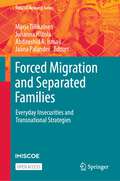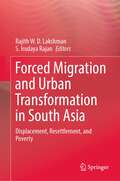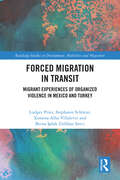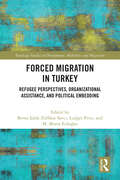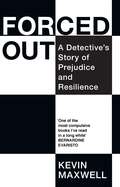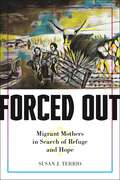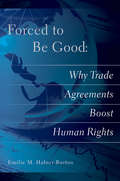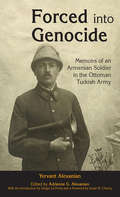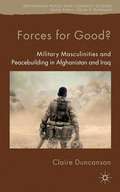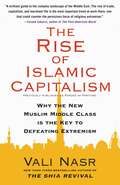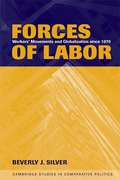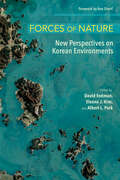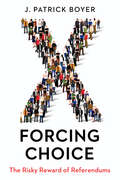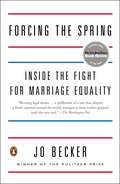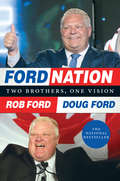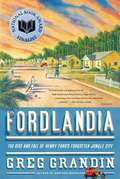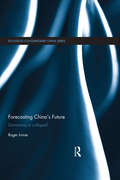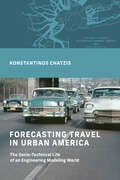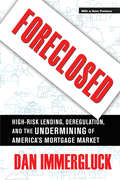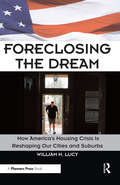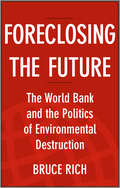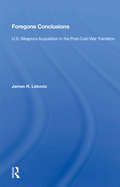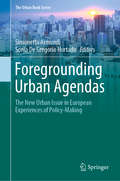- Table View
- List View
Forced Migration and Separated Families: Everyday Insecurities and Transnational Strategies (IMISCOE Research Series)
by Marja Tiilikainen Johanna Hiitola Abdirashid A. Ismail Jaana PalanderThis open access book examines the impacts and experiences of family separation on forced migrants and their transnational families. On the one hand, it investigates how people with a forced migration background in Europe, the Middle East, and Latin America experience separation from their families, and on the other, how family and kin in the countries of origin or transit are impacted by the often precarious circumstances of their family members in receiving countries. In particular, this book provides new knowledge on the nexus between transnational family separation, forced migration, and everyday (in)security. Additionally, it yields comparative information for assessing the impacts of relevant legislation and administrative practice in a number of national contexts. Based on rich empirical data, including unique cases about South-South migration, the findings in this book are highly relevant to academics in migration and refugee studies as well as policy-makers, legislators and practitioners.
Forced Migration and Urban Transformation in South Asia: Displacement, Resettlement, and Poverty
by S. Irudaya Rajan Rajith W. D. LakshmanThis book discusses the displacement of urban populations, inequality, and poverty in three cities in South Asia—Colombo, Jaffna in Sri Lanka, and Kochi in India. It focuses on the long-term effect resettlement and relocation has on the lives and livelihoods of urban internal displacement of populations (IDPs) primarily from urban poor classes. It also discusses the concerns faced by the displacement in post-war Sri Lanka. It examines the impacts of conflict on poverty and recovery in peri-urban settings. It emphasizes the role of agency of urban IDPs in strengthening their own well-being. It draws attention to how the agency of urban IDPs is compromised by the displacement processes and the weak local level governance structures in the cities. The book is intended for researchers, graduate students, and teachers of Geography, Social Policy, Refugees and Migration Studies, History, International Development, Urban Studies, and South Asian Studies.
Forced Migration in Transit: Migrant Experiences of Organized Violence in Mexico and Turkey (Routledge Studies in Development, Mobilities and Migration)
by Ludger Pries Stephanie Schütze Ximena Alba Villalever Berna Safak Zülfikar SavciThis book compares the life courses of forced migrants in two of the world’s most important transit countries: Turkey and Mexico. It examines the local, regional, and global contexts of their experiences, trajectories, and biographical projects, caught between return, stay, and forward movement.Forced migration has increased rapidly around the world in recent years, with Mexico and Turkey experiencing particularly high numbers of migrants, as conflict, violence, authoritarian regimes, environmental disasters, economic instability, lack of opportunity, and generalized violence have driven people to leave their homes in search of a better life. With a special focus on organized violence, this book analyzes the specific impact of organized violence on the trajectories and biographies of forced migrants, situating these life courses in the political, economic, cultural, and social contexts of the countries of origin (Afghanistan, Iraq and Syria; El Salvador, Guatemala, and Honduras) and in the country of transit (Turkey and Mexico). Using extensive original empirical data and analysis, it argues that forced migration is a long-lasting social process based on everyday actions and social practices throughout the migration trajectory.Systematically comparing two of the world’s most important transit countries, this book will be of interest to researchers in the fields of migration, politics, international relations, and sociology.
Forced Migration in Turkey: Refugee Perspectives, Organizational Assistance, and Political Embedding (Routledge Studies in Development, Mobilities and Migration)
by Ludger Pries Şafak Zülfikar Savcı, Berna M. Murat ErdoğanTurkey hosts more refugees than any other country in the world, with forced migrants from Syria, Afghanistan, Pakistan, Iraq, and other countries converging, either with hopes to settle in Turkey or to continue onwards to the European Union (EU).This volume addresses the specific experiences and trajectories of forced migrants in Turkey in the context of local and national contexts and the future of EU-Turkey relations. It presents the demographics of forced migrants, the biographies and future plans of refugees, and their interactions with civil society, states, and international agencies. A focus is on organized violence and corresponding experiences in countries of origin, during transit, and at current places.Based on extensive quantitative and qualitative research, this book will be of interest to researchers and practitioners in the fields of migration, human security, and refugee studies, as well as of sociology, political sciences, and international relations.
Forced Out: A Detective's Story of Prejudice and Resilience
by Kevin MaxwellA gay, black, British police officer&’s memoir of prejudice, racism and homophobia on the force in the twenty-first century.Kevin Maxwell was a dream candidate for the police force—he had a long-held desire to serve his community, a strong moral compass and a clear aptitude for both the strategic and practical aspects of policing. And, as a gay black man from a working-class family, he could easily have been a poster boy for the force&’s stated commitment to equal opportunities. Joining just after the 9/11 attacks, Kevin entered policing determined to keep communities safe in the face of a changing world. But instead, he came up against entrenched prejudice, open racism and homophobia. For more than ten years, Kevin strove against the odds, until he took the force to an employment tribunal—with devastating results.Forced Out is a revelatory exposé combining deeply affecting memoir with sharp analysis and a fascinating insider perspective on day-to-day life in the force. It is a touchstone for the silent many who have either tried to ignore abuse for the sake of their career or who have been bullied out of their jobs. It paints a sobering portrait of an institution that has not yet learned the lessons of the past and whose prejudice is informing the cases it chooses to investigate and the way it investigates them. And it asks the important question: what needs to change?&“One of the most compulsive books I&’ve read in a long while.&” –Bernadine Evaristo, award-winning author of Girl, Woman, Other
Forced Out: Migrant Mothers in Search of Refuge and Hope
by Susan J. TerrioFeatures the stories of undocumented mothers who reunite with their children in the US years after fleeing violence at homeFacing escalating chaos and violence in their home countries, many Central American mothers have found that a desperate flight to the north was their only choice. Many left their children behind in order to spare them the hardships of the journey. If they made it across the border without getting locked up or deported, they entered a country increasingly unwilling to recognize claims of asylum.This book features the stories of women who crossed the border without encountering immigration authorities, in some cases several times, and settled in the greater Washington, DC, area, living in the shadows for years. By centering on the voices of the women themselves, it offers an intimate look at what drove them from home and the challenges they face in reuniting years later with their children.Forced Out traces the women’s evolving attitudes toward the violence embedded in institutions and everyday life in their home countries, as well as their continued vulnerability and dependence in the US. It also highlights the challenges they face in parenting children adapting to American society and learning English while living with mothers who had left them years before and become strangers to them. Rather than sensationalizing their trauma or dwelling on their vulnerability, the stories reveal the women’s rich, complex inner lives, their resilience in overcoming senseless violence, and their unswerving commitment to bettering their children’s lives. Clear, vivid, and impactful, this is a humbling and humane look at the state of migration to America today.
Forced To Be Good: Why Trade Agreements Boost Human Rights
by Emilie M. Hafner-BurtonPreferential trade agreements have become common ways to protect or restrict access to national markets in products and services. The United States has signed trade agreements with almost two dozen countries as close as Mexico and Canada and as distant as Morocco and Australia. The European Union has done the same. In addition to addressing economic issues, these agreements also regulate the protection of human rights. In Forced to Be Good, Emilie M. Hafner-Burton tells the story of the politics of such agreements and of the ways in which governments pursue market integration policies that advance their own political interests, including human rights. How and why do global norms for social justice become international regulations linked to seemingly unrelated issues, such as trade? Hafner-Burton finds that the process has been unconventional. Efforts by human rights advocates and labor unions to spread human rights ideals, for example, do not explain why American and European governments employ preferential trade agreements to protect human rights. Instead, most of the regulations protecting human rights are codified in global moral principles and laws only because they serve policymakers' interests in accumulating power or resources or solving other problems. Otherwise, demands by moral advocates are tossed aside. And, as Hafner-Burton shows, even the inclusion of human rights protections in trade agreements is no guarantee of real change, because many of the governments that sign on to fair trade regulations oppose such protections and do not intend to force their implementation. Ultimately, Hafner-Burton finds that, despite the difficulty of enforcing good regulations and the less-than-noble motives for including them, trade agreements that include human rights provisions have made a positive difference in the lives of some of the people they are intended-on paper, at least-to protect.
Forced into Genocide: Memoirs of an Armenian Soldier in the Ottoman Turkish Army (Genocide Studies)
by Adrienne G. AlexanianThis memoir recalls Yervant Alexanian’s death-defying experiences in the center of the Armenian Genocide. Like other Armenians of his generation, he was an eyewitness to the massacre and dislocation of his family and fellow countrymen in Ottoman Turkey during World War I. Alexanian was conscripted into the Turkish army—but unlike others so conscripted, he survived. Alexanian was forced to become an onlooker while he watched the atrocities unfold. His story of resourceful action and fateful turns is a suspenseful “insider’s account” of a Genocide survivor. From his singular position, Alexanian was able to document the tragedy of his people in his journals and diaries, but he also offers us a behind-the-scenes look into the motivations and actions of Turkish military officials as they committed the atrocities. His story continues after the war as we follow the trail of his journey through Europe and finally to America, where he found solace and was able to start anew with fellow survivors. No comparable account exists in the literature of the Armenian Genocide. This edition, translated from Alexanian’s hand-written Armenian-language chronicle, includes never-before-seen documents and photos that the author preserved. Through his eyes we relive the astonishing cruelty of the Genocide’s perpetrators—but also rare, unexpected acts of humanity between victim and oppressor.
Forces for Good?
by Claire DuncansonThis book utilises the growing phenomenon of British soldier narratives from Iraq and Afghanistan to explore how British soldiers make sense of their role on these complex, multi-dimensional operations. It aims to intervene in the debates within critical feminist scholarship over whether soldiers can ever be agents of peace.
Forces of Fortune: The Rise of the New Muslim Middle Class and What It Will Mean for Our World
by Vali NasrFrom a "New York Times"-bestselling author comes a paradigm-changing revelation of the misunderstood rising force in the Islamic world--a non-extremist new middle class--that holds the key to winning the new Cold War against Iran and extremists.
Forces of Labor: Workers' Movements and Globalization Since 1870 (Cambridge Studies in Comparative Politics)
by Beverly J. SilverRecasting labor studies in a long-term and global framework, the book draws on a major new database on world labor unrest to show how local labor movements have been related to world-scale political, economic, and social processes since the late nineteenth century. Through an in-depth empirical analysis of select global industries, the book demonstrates how the main locations of labor unrest have shifted from country to country together with shifts in the geographical location of production. It shows how the main sites of labor unrest have shifted over time together with the rise or decline of new leading sectors of capitalist development and demonstrates that labor movements have been deeply embedded (as both cause and effect) in world political dynamics. ,p>Over the history of the modern labor movement, the book isolates what is truly novel about the contemporary global crisis of labor movements. Arguing against the view that this is a terminal crisis, the book concludes by exploring the likely forms that emergent labor movements will take in the twenty-first century.
Forces of Nature: New Perspectives on Korean Environments (The Environments of East Asia)
by David Fedman, Eleana J. Kim, and Albert L. ParkBringing together a multidisciplinary conversation about the entanglement of nature and society in the Korean peninsula, Forces of Nature aims to define and develop the field of the Korean environmental humanities. At its core, the volume works to foreground non-human agents that have long been marginalized in Korean studies, placing flora, fauna, mineral deposits, and climatic conditions that have hitherto been confined to footnotes front and center. In the process, the authors blaze new trails through Korea's social and physical landscapes.What emerges is a deeper appreciation of the environmental conflicts that have animated life in Korea. The authors show how natural processes have continually shaped the course of events on the peninsula—how floods, droughts, famines, fires, and pests have inexorably impinged on human affairs—and how different forces have been mobilized by the state to variously, control, extract, modernize, and showcase the Korean landscape. Forces of Nature suggestively reveals Korea's physical landscape to be not so much a passive context to Korea's history, but an active agent in its transformation and reinvention across centuries.This book is freely available in an open access edition through the generous support of the Henry Luce Foundation.
Forces of Order: Policing Modern Japan
by David H. BayleyPolice behavior in Japan and the United States
Forcing Choice: The Risky Reward of Referendums
by J. Patrick BoyerCanadians answered “Yes” or “No” to prohibiting alcohol, conscripting soldiers, and revamping our constitution. Forcing such crucial choices at the ballot box is high-stakes democracy, both here and overseas — as witnessed with Britain’s transformative 2016 “Brexit” referendum. Forcing Choice dissects Canada’s extensive use of ballot questions at all levels of government, and weighs the benefits of citizens making fundamental decisions for the nation. Holding referendums is tricky, and getting it wrong carries a high price. This hard-hitting book draws on Boyer’s deep research on direct democracy and his experience advising governments about referendums, writing books, drafting and introducing the Canada Referendum Act, monitoring foreign referendums, and campaigning in Canadian ones.
Forcing the Spring
by Jo Becker*A New York Times Notable Book of the Year** A Washington Post Best Book of the Year (Nonfiction)** A Kirkus Best Book of the Year*"[A] riveting legal drama, a snapshot in time, when the gay rights movement altered course and public opinion shifted with the speed of a bullet train... Becker's most remarkable accomplishment is to weave a spellbinder of a tale that, despite a finale reported around the world, manages to keep readers gripped until the very end." --The Washington Post A tour de force of groundbreaking reportage by Pulitzer Prize-winning journalist Jo Becker, Forcing the Spring is the definitive account of five remarkable years in American civil rights history: when the United States experienced a tectonic shift on the issue of marriage equality. Beginning with the historical legal challenge of California's ban on same-sex marriage, Becker expands the scope to encompass all aspects of this momentous struggle, offering a gripping behind-the-scenes narrative told with the lightning pace of the greatest legal thrillers. For nearly five years, Becker was given free rein in the legal and political war rooms where the strategy of marriage equality was plotted. She takes us inside the remarkable campaign that rebranded a movement; into the Oval Office where the president and his advisors debated how to respond to a fast-changing political landscape; into the chambers of the federal judges who decided that today's bans on same-sex marriage were no more constitutional than the previous century's bans on interracial marriage; and into the mindsets of the Supreme Court judges who decided the California case and will likely soon decide the issue for the country at large. From the state-by state efforts to win marriage equality at the ballot box to the landmark Supreme Court case that struck down a law that banned legally married gay and lesbian couples from receiving federal benefits, Becker weaves together the political and legal forces that reshaped a nation. Forcing the Spring begins with California's controversial ballot initiative Proposition 8, which banned gay men and lesbians from marrying the person they loved. This electoral defeat galvanized an improbable alliance of opponents to the ban, with political operatives and Hollywood royalty enlisting attorneys Ted Olson and David Boies--the opposing counsels in the Supreme Court's Bush v. Gore case--to join together in a unique bipartisan challenge to the political status quo. Despite stiff initial opposition from the gay rights establishment, the case against Proposition 8 would ultimately force the issue of marriage equality all the way to the Supreme Court, transforming same-sex marriage from a partisan issue into a modern crisis of civil rights. Based on singular access to the internal workings of this momentous trial--and enlivened by original interviews with the participants on both sides of the case, many speaking for the first time--Forcing the Spring is at once an emotion-packed tale of love and determination as well as an eye-opening examination of an evidentiary record that federal courts across the nation are now relying on to strike down bans similar to California's. Shuttling between the twin American power centers of Hollywood and Washington--and based on access to all the key players in the Justice Department and the White House--Becker offers insider coverage on the true story of how President Obama "evolved" to embrace marriage equality, his surprising role in the Supreme Court battle, and the unexpected way the controversial issue played in the 2012 elections. What starts out as a tale of an epic legal battle grows into the story of the evolution of a country, a testament and old-fashioned storytelling to move public opinion. Becker shows how the country reexamined its opinions on same-sex marriage, an issue that raced along with a snowballing velocity which astounded veteran political operatives, as public opinion on same-sex marriage flipped and elected officials repositioned themselves to adjust to a dramatically changed environment. Forcin...
Forcing the Spring: Inside the Fight for Marriage Equality
by Jo BeckerA tour de force of groundbreaking reportage by Pulitzer Prize-winning journalist Jo Becker, Forcing the Spring is the definitive account of five remarkable years in American civil rights history: when the United States experienced a tectonic shift on the issue of marriage equality. Beginning with the historical legal challenge of California's ban on same-sex marriage, Becker expands the scope to encompass all aspects of this momentous struggle, offering a gripping behind-the-scenes narrative told with the lightning pace of the greatest legal thrillers.<P> For nearly five years, Becker was given free rein in the legal and political war rooms where the strategy of marriage equality was plotted. She takes us inside the remarkable campaign that rebranded a movement; into the Oval Office where the president and his advisors debated how to respond to a fast-changing political landscape; into the chambers of the federal judges who decided that today's bans on same-sex marriage were no more constitutional than the previous century's bans on interracial marriage; and into the mindsets of the Supreme Court judges who decided the California case and will likely soon decide the issue for the country at large. From the state-by state efforts to win marriage equality at the ballot box to the landmark Supreme Court case that struck down a law that banned legally married gay and lesbian couples from receiving federal benefits, Becker weaves together the political and legal forces that reshaped a nation.<P> Forcing the Spring begins with California's controversial ballot initiative Proposition 8, which banned gay men and lesbians from marrying the person they loved. This electoral defeat galvanized an improbable alliance of opponents to the ban, with political operatives and Hollywood royalty enlisting attorneys Ted Olson and David Boies--the opposing counsels in the Supreme Court's Bush v. Gore case--to join together in a unique bipartisan challenge to the political status quo. Despite stiff initial opposition from the gay rights establishment, the case against Proposition 8 would ultimately force the issue of marriage equality all the way to the Supreme Court, transforming same-sex marriage from a partisan issue into a modern crisis of civil rights. Based on singular access to the internal workings of this momentous trial--and enlivened by original interviews with the participants on both sides of the case, many speaking for the first time--Forcing the Spring is at once an emotion-packed tale of love and determination as well as an eye-opening examination of an evidentiary record that federal courts across the nation are now relying on to strike down bans similar to California's.<P> Shuttling between the twin American power centers of Hollywood and Washington--and based on access to all the key players in the Justice Department and the White House--Becker offers insider coverage on the true story of how President Obama "evolved" to embrace marriage equality, his surprising role in the Supreme Court battle, and the unexpected way the controversial issue played in the 2012 elections.<P> What starts out as a tale of an epic legal battle grows into the story of the evolution of a country, a testament and old-fashioned storytelling to move public opinion. Becker shows how the country reexamined its opinions on same-sex marriage, an issue that raced along with a snowballing velocity which astounded veteran political operatives, as public opinion on same-sex marriage flipped and elected officials repositioned themselves to adjust to a dramatically changed environment. Forcing the Spring is the ringside account of this unprecedented change, the fastest shift in public opinion ever seen in ...
Ford Nation: Two Brothers, One Vision
by Rob Ford Doug FordDuring his tumultuous term as mayor of Toronto, Rob Ford always stayed on message—saving taxpayers money and putting the brakes on the “gravy train” at city hall. He also returned every phone call, even showing up on people’s doorsteps late at night to help them with their problems. But despite his hard work to cut excessive spending and to address the city’s crumbling infrastructure, the media delighted in showcasing Ford’s most personal struggles instead. Reporters followed him to his car, onto his front lawn, and trailed behind while he trick-or-treated with his children. The city, the country, the entire world watched Rob Ford battle substance abuse, but they rarely saw or heard the real story behind Ford—the family man, the faithful public servant, the devoted husband, father, and brother who put the people of his city above all else.In Ford Nation, Doug Ford, Rob’s brother and most trusted advisor, shares the true story of the two brothers and the Ford family: from the early days of their parents’ marriage, as Diane and Doug Sr worked tirelessly to get their company, Deco Labels and Tags, off the ground; to the Etobicoke house filled with the Ford children; to Doug Sr’s entry into provincial politics, with Rob and Doug following in his footsteps, to city hall. Ford Nation recounts the triumphs and strug-gles of Rob and Doug in their own voices—as well as the voices of their mother, Diane, nephew Michael, Rob’s widow, Renata, and daughter, Stephanie—from knocking on doors as new candidates to knocking out opponents in council chamber debates.When Rob was forced to end his campaign to remain mayor of Toronto, Doug didn’t hesitate to jump into the race, and despite his very late start he almost pulled off an upset. Doug shares what life was like for the family during this difficult time, and what it was like in the final hour of Rob’s life, when he succumbed to cancer and became, in his daughter Stephanie’s words, “the mayor of heaven.”Drawing on a number of sources to share Rob’s life in his own words after he became too ill to continue working on the book, Ford Nation is the only book that accurately captures the entire account of Rob and Doug Ford and their fight to protect the rights of the little guy.
Fordlandia: The Rise and Fall of Henry Ford's Forgotten Jungle City
by Greg GrandinThe stunning, never before told story of the quixotic attempt to recreate small-town America in the heart of the Amazon In 1927, Henry Ford, the richest man in the world, bought a tract of land twice the size of Delaware in the Brazilian Amazon. His intention was to grow rubber, but the project rapidly evolved into a more ambitious bid to export America itself, along with its golf courses, ice-cream shops, bandstands, indoor plumbing, and Model Ts rolling down broad streets. Fordlandia, as the settlement was called, quickly became the site of an epic clash. On one side was the car magnate, lean, austere, the man who reduced industrial production to its simplest motions; on the other, the Amazon, lush, extravagant, the most complex ecological system on the planet. Ford's early success in imposing time clocks and square dances on the jungle soon collapsed, as indigenous workers, rejecting his midwestern Puritanism, turned the place into a ribald tropical boomtown. Fordlandia's eventual demise as a rubber plantation foreshadowed the practices that today are laying waste to the rain forest. More than a parable of one man's arrogant attempt to force his will on the natural world,Fordlandia depicts a desperate quest to salvage the bygone America that the Ford factory system did much to dispatch. As Greg Grandin shows in this gripping and mordantly observed history, Ford's great delusion was not that the Amazon could be tamed but that the forces of capitalism, once released, might yet be contained.
Forecasting China's Future: Dominance or Collapse? (Routledge Contemporary China Series)
by Roger IrvineChina’s future development is likely to have a huge impact on twenty-first century global outcomes. It is therefore surprising that, thus far, so little attention has been given to comparing and evaluating expert forecasts of China’s future in the post-Mao era. This book presents an illuminating and comprehensive summary record of contrasting and competing expert forecasts and judgements about the major issues confronting China within four principal domains – political, economic, environmental, and international. After considering the principal forecasting methods available to experts, the author comments critically on the degree of success achieved in using those methods and emphasises the confusion created by the polarisation of opinion and by the failure of many experts to accept the high degree of uncertainty that characterises most of the key issues. The book recommends a new approach based on the study of a hierarchy of critical uncertainties and on continuing analysis of opposing expert opinions about these uncertainties. It emphasises the potential for both positive and negative outcomes for these critical uncertainties, and the importance of maximising the potential for positive outcomes through improved analytical and policy frameworks. Providing insights for specialists and non-specialists into the most critical issues that will determine China’s future direction, this book will be of particular interest to students and scholars of political, economic, environmental, and international relations issues in China and Asia, as well as to readers in business and government.
Forecasting Travel in Urban America: The Socio-Technical Life of an Engineering Modeling World
by Konstantinos ChatzisA history of urban travel demand modeling (UTDM) and its enormous influence on American life from the 1920s to the present.For better and worse, the automobile has been an integral part of the American way of life for decades. Its ascendance would have been far less spectacular, however, had engineers and planners not devised urban travel demand modeling (UTDM). This book tells the story of this irreplaceable engineering tool that has helped cities accommodate continuous rise in traffic from the 1950s on. Beginning with UTDM&’s origins as a method to help plan new infrastructure, Konstantinos Chatzis follows its trajectory through new generations of models that helped make optimal use of existing capacity and examines related policy instruments, including the recent use of intelligent transportation systems.Chatzis investigates these models as evolving entities involving humans and nonhumans that were shaped through a specific production process. In surveying the various generations of UTDM, he delves into various means of production (from tabulating machines to software packages) and travel survey methods (from personal interviews to GPS tracking devices and smartphones) used to obtain critical information. He also looks at the individuals who have collectively built a distinct UTDM social world by displaying specialized knowledge, developing specific skills, and performing various tasks and functions, and by communicating, interacting, and even competing with one another.Original and refreshingly accessible, Forecasting Travel in Urban America offers the first detailed history behind the thinkers and processes that impact the lives of millions of city dwellers every day.
Foreclosed: High-Risk Lending, Deregulation, and the Undermining of America's Mortgage Market
by Dan ImmergluckIn 2007 and 2008, the United States has observed, with some horror, the explosion and collapse of entire segments of the housing market, especially those driven by subprime and alternative or "exotic" home mortgage lending. Foreclosed explains the rise of high-risk lending and why these newer types of loans-and their associated regulatory infrastructure-failed in substantial ways. Dan Immergluck narrates the boom in subprime and exotic loans, recounting how financial innovations and deregulation facilitated excessive risk-taking, and how these loans have harmed different populations and communities.Immergluck, who has been working, researching, and writing on issues tied to housing finance and neighborhood change for almost twenty years, has an intimate knowledge of the promotion of homeownership and the history of mortgages in the United States. The changes to the mortgage market over the past fifteen years-including the securitization of mortgages and the failure of regulators to maintain control over a much riskier array of mortgage products-led, he finds, inexorably to the current crisis.After describing the development of generally stable and risk-limiting mortgage markets throughout much of the twentieth century, Foreclosed details how federal policy-makers failed to regulate the new high-risk lending markets that arose in the late 1990s and early 2000s. The book also examines federal, state, and local efforts to deal with the mortgage and foreclosure crisis of 2007 and 2008. Immergluck draws upon his wealth of experience to provide an overarching set of principles and a detailed set of policy recommendations for "righting the ship" of U.S. housing finance in ways that will promote affordable yet sustainable homeownership as an option for a broad set of households and communities. The 2011 edition features a new preface by the author addressing the ongoing global economic crisis and the impact of U.S. financial reform efforts on the mortgage system.
Foreclosing the Dream: How America's Housing Crisis is Reshaping our Cities and Suburbs
by William LucyThat America entered a profound housing crisis in 2008 is well known. The wave of foreclosures that began to sweep the nation has had radical economic effects. But the force, ramifications, and implications for communities across America have never been spelled out as clearly and thoroughly as they are in this volume. As he did in Tomorrow's Cities, Tomorrow's Suburbs, the author has taken a clear-eyed and meticulous look at the latest data and found lessons that the mainstream discussion has overlooked - particularly with regard to the spatial and demographic implications of the housing crisis. The housing market did not collapse uniformly, and the pain has not been felt equally in all age groups. Planners, public officials, activists, students, and others will benefit from the author's's analysis of the real shape of the crisis, for what happens next will reflect these inequities. The author pulls no punches in this taut, readable assessment of what the crisis will mean for the shapes of our exurbs, older suburbs, and central cities.
Foreclosing the Future
by Bruce RichWorld Bank President Jim Yong Kim has vowed that his institution will fight poverty and climate change, a claim that World Bank presidents have made for two decades. But if worldwide protests and reams of damning internal reports are any indication, too often it does just the opposite. By funding development projects and programs that warm the planet and destroy critical natural resources on which the poor depend, the Bank has been hurting the very people it claims to serve. What explains this blatant contradiction? If anyone has the answer, it is arguably Bruce Rich—a lawyer and expert in public international finance who has for the last three decades studied the Bank’s institutional contortions, the real-world consequences of its lending, and the politics of the global environmental crisis. What emerges from the bureaucratic dust is a disturbing and gripping story of corruption, larger-than-life personalities, perverse incentives, and institutional amnesia. The World Bank is the Vatican of development finance, and its dysfunction plays out as a reflection of the political hypocrisies and failures of governance of its 188 member countries. Foreclosing the Future shows how the Bank’s failure to address the challenges of the 21st Century has implications for everyone in an increasingly interdependent world. Rich depicts how the World Bank is a microcosm of global political and economic trends—powerful forces that threaten both environmental and social ruin. Rich shows how the Bank has reinforced these forces, undercutting the most idealistic attempts at alleviating poverty and sustaining the environment, and damaging the lives of millions. Readers will see global politics on an increasingly crowded planet as they never have before—and come to understand the changes necessary if the World Bank is ever to achieve its mission.
Foregone Conclusions: U.s. Weapons Acquisition In The Post-cold War Transition
by James H. LebovicWith the end of the Cold War and the erosion of the Soviet threat, the United States is reevaluating its defense policy and its acquisition of weapons. James Lebovic shows that, although current military missions are adapted to post-Cold War realities, the self-defeating bias of bureaucrats and military services toward Cold War weaponry is still prevalent. He examines the impact of this bias on the armed services as they assess threat, generate requirements, develop and change weapon concepts, set production rates, and engage in testing. The author asserts that bias compromises service interests and broader military objectives and he offers general policy recommendations to put U.S. weapons acquisition on a more effective track.
Foregrounding Urban Agendas: The New Urban Issue in European Experiences of Policy-Making (The Urban Book Series)
by Simonetta Armondi Sonia De Gregorio HurtadoThis book highlights the discontinuities and the ongoing development of the urban question in policy-making in the context of the controversial current issues of global reversal and regional revival. It critically examines contemporary public policies and practices at the urban, regional and national scales in order to offer a timely contribution to the debate on the significance of the urban dimension and interpretation in terms of the theory, policy and practice of social-spatial research in the twenty-first century. Focusing on Europe, it explores the current urban policy agendas at different scales - and the mobility of those agendas -, their implications, contradictions and controversies. It brings together original contributions from multiple disciplines but with an urban perspective, including empirical case studies and critical discussions of the following topics:the UN 2030 Agenda for Sustainable Development, the global “New Urban Agenda” as part of the Habitat III process;the Urban Agenda for the European Union;national spatial policies related to urban agendas;urban agendas at regional/urban levels;city regionalism discourse and state rescaling;new formal regional and metropolitan governments as a solution (or problem);the role of new actors in regional urbanization dynamics; multi-level governance processes in developing an urban agenda; informal assemblages at the metropolitan scale aiming at constructing the urban concept and dimension.Given its scope, the book is of interest to urban, regional and EU policy-makers, scholars and students working in the fields of urban geography, urban studies, EU urban and regional policies, and planning.
